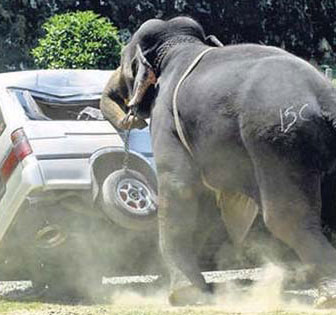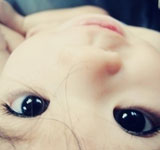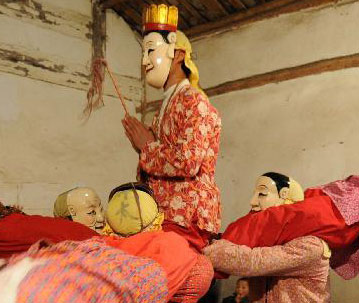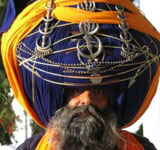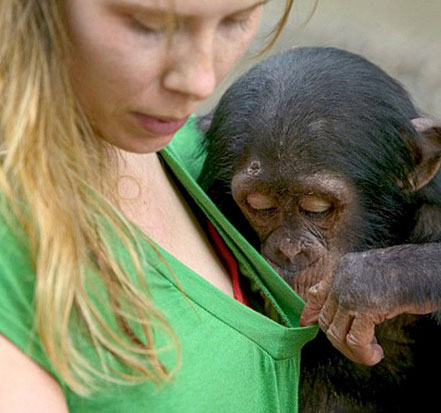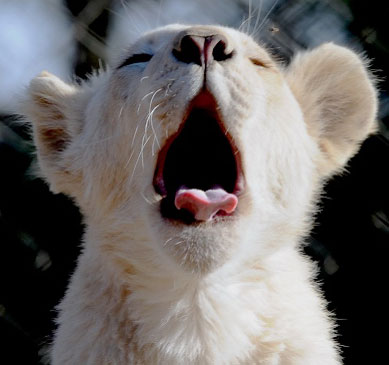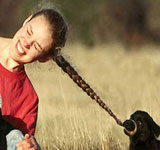| 鏄ヨ妭涔犱織锛氬挶杩囧勾缂轰笉浜嗙殑8浠朵簨鍎?/td> | |
http://english.dbw.cn銆€銆€
2012-02-13 10:07:28
|
|
|
Chinese New Year Celebration is the most important celebration of the year. Chinese people may celebrate the Chinese New Year in slightly different ways but their wishes are almost the same; they want their family members and friends to be healthy and lucky during next year.
鏄ヨ妭搴嗙娲诲姩鏄竴骞翠腑鏈€閲嶈鐨勫簡绁濇椿鍔ㄣ€備腑鍥戒汉搴嗙鏄ヨ妭鐨勬柟寮忓彲鑳界暐寰笉鍚岋紝浣嗗叾鎰挎湜鍑犱箮鏄浉鍚岀殑锛屼粬浠笇鏈涘叾瀹朵汉鍜屾湅鍙嬫潵骞村仴搴峰拰骞歌繍銆?/div>
Chinese New Year Celebration usually lasts for 15 days. Celebratory activities include Chinese New Feast, firecrackers, giving lucky money to children, the New Year bell ringing and Chinese New Year Greetings. Most of Chinese people will stop the celebrating in their home on the 7th day of New Year because the national holiday usually ends around that day, however celebrations in public areas can last until the 15th day of New Year.
鏄ヨ妭搴嗙娲诲姩閫氬父鎸佺画15澶┿€傚簡绁濇椿鍔ㄥ寘鎷槬鑺傜殑骞村楗紝鏀鹃灜鐐紝缁欏効绔ュ帇宀侀挶锛屾槬鑺傞挓澹板拰鏄ヨ妭闂€欍€傚ぇ澶氭暟涓浗浜哄皢鍦ㄦ槬鑺傜殑绗?澶╁仠姝㈠簡绁濇椿鍔紝鍥犱负鍏ㄥ浗鎬ц妭鍋囬€氬父鍦ㄨ繖涓€澶╃粨鏉燂紝浣嗗湪鍏叡鍦烘墍鐨勫簡绁濇椿鍔ㄥ彲鑳芥渶缁堟寔缁埌姝f湀鍗佷簲銆?/div>
To clean houses on the New Year Even is a very old custom dating back to thousands of years ago. The dust is traditionally associated with 鈥渙ld鈥?so cleaning their houses and sweeping the dust mean to bid farewell to the 鈥渙ld鈥?and usher in the 鈥渘ew鈥? Days before the New Year, Chinese families clean their houses, sweeping the floor, washing daily things, cleaning the spider webs and dredging the ditches. People do all these things happily in the hope of a good coming year.
鏄ヨ妭鎵撴壂鎴垮眿杩欎釜闈炲父鍙よ€佺殑涔犱織鐢氳嚦鍙互杩芥函鍒板嚑鍗冨勾鍓嶃€傜伆灏樺湪浼犵粺涓婁笌鈥滄棫鈥濊仈绯诲湪涓€璧凤紝鎵€浠ユ墦鎵埧灞嬪拰鎵櫎鐏板皹鎰忓懗鐫€杈炩€滄棫鈥濊繋鈥滄柊鈥濄€傛槬鑺傜殑鍓嶅嚑澶╋紝涓浗鐨勫悇瀹跺悇鎴烽兘鎵撴壂鎴垮眿锛屾壂鍦帮紝娓呮礂鏃ョ敤鍝侊紝娓呴櫎铔涚綉鍜岀枏娴氭矡娓犮€備汉浠叴楂橀噰鐑堝仛鎵€鏈夎繖浜涗簨鎯咃紝甯屾湜鏉ュ勾濂借繍銆?/div>
One of the house decorations is to post couplets on doors. On the Spring Festival couplets, good wishes are expressed. New Year couplets are usually posted in pairs as even numbers are associated with good luck and auspiciousness in Chinese culture.
鎴垮眿瑁呴グ涔嬩竴灏辨槸鍦ㄩ棬涓婅创瀵硅仈銆傚湪鏄ヨ仈涓婏紝鎶掑彂鑹ソ鐨勭鎰裤€傛槬鑱旈€氬父鏄垚瀵瑰紶璐达紝鍥犱负鍙屾暟鍦ㄤ腑鍥芥枃鍖栦腑鏄ソ杩愭皵鍜屽悏绁ョ殑璞″緛銆?/div>
People in north China are used to posting paper-cut on their windows. When sticking the window decoration paper-cuts, people paste on the door large red Chinese character 鈥渇u鈥滱 red "fu"means good luck and fortune, so it is customary to post "fu"on doors or walls on auspicious occasions such as wedding, festivals.
鍦ㄤ腑鍥藉寳鏂癸紝浜轰滑涔犳儻浜庡湪绐楁埛涓婅创鍓焊銆備汉浠棦鍦ㄧ獥鎴蜂笂璐村壀绾革紝鍙堝湪澶ч棬涓婅创涓婂ぇ澶х殑绾㈣壊姹夊瓧鈥滅鈥濆瓧锛屼竴涓孩鑹测€滅鈥濆瓧鎰忓懗鐫€濂借繍鍜岃储瀵岋紝鍥犳涔犳儻涓婂湪濠氱ぜ锛岃妭鏃ヤ箣绫荤殑鍚夌ゥ鍦哄悎涓紝浜轰滑閮戒細鍦ㄩ棬鎴栧涓婅创鈥滅鈥濆瓧銆?/div>
The first bell ringing is the symbol of Chinese New Year. Chinese people like to go to a large squares where there are huge bells are set up on New Year鈥檚 Eve. As the New Year approaches they count down and celebrate together. The people believe that the ringing of huge bell can drive all the bad luck away and bring the fortune to them. In recent years, some people have begun going to mountain temples to wait for the first ringing. Hanshan Temple in Suzhou, is very famous temple for its first ringing of the bell to herald Chinese New Year. Many foreigners now go to Hanshan Temple to celebrate Chinese New Year.
绗竴娆¢挓澹版槸鏄ヨ妭鐨勮薄寰併€備腑鍥戒汉鍠滄鍒颁竴涓ぇ骞垮満锛岄偅閲屾湁涓洪櫎澶曡缃殑澶ч挓銆傞殢鐫€鏄ヨ妭鐨勪复杩戯紝浠栦滑寮€濮嬪€掕鏁板苟涓€璧峰簡绁濄€備汉浠浉淇′簡澶ч挓鐨勬挒鍝嶅彲浠ラ┍闄ら湁杩愶紝甯︽潵濂借繍銆傝繎骞存潵锛屾湁浜涗汉寮€濮嬪幓灞变笂瀵哄簷绛夊緟绗竴娆¢挓澹般€傝嫃宸炵殑瀵掑北瀵哄氨闈炲父钁楀悕锛屽畠鐨勯挓澹板甯冩槬鑺傜殑鍒版潵銆傜幇鍦ㄦ湁璁稿澶栧浗浜轰篃鍘诲瘨灞卞搴嗙鏄ヨ妭銆?/div>
Shousui means to stay up late or all night on New Year's Eve. After the great dinner, families sit together and chat happily to wait for the New Year鈥檚 arrival.
瀹堝瞾鎰忓懗鐫€闄ゅ澶滀笉鐫¤銆傚勾澶滈キ鍚庯紝瀹朵汉鑱氬潗涓€璧凤紝鎰夊揩鑱婂ぉ锛岀瓑寰呮槬鑺傜殑鍒版潵銆?/div>
Spring Festival is a time for family reunion. The New Year's Feast is "a must" banquet with all the family members getting together. The food eaten on the New Year Even banquet varies according to regions. In south China, It is customary to eat "niangao" (New Year cake made of glutinous rice flour) because as a homophone, niangao means "higher and higher every year". In the north, a traditional dish for the feast is "Jiaozi" or dumplings shaped like a crescent moon.
鏄ヨ妭鏄笌瀹朵汉鍥㈣仛鐨勬椂闂淬€傚勾澶滈キ鏄墍鏈夊搴垚鍛樿仛鍦ㄤ竴璧封€滃繀椤烩€濈殑瀹翠細銆傞櫎澶曞浼氫笂鍚冪殑椋熺墿鏍规嵁涓嶅悓鐨勫湴鍖哄悇涓嶇浉鍚屻€傚湪涓浗鍗楁柟锛屼範鎯悆鈥滃勾绯曗€濓紙绯背绮夊埗鎴愮殑鏂板勾绯曠偣锛夛紝鍥犱负浣滀负涓€涓悓闊冲瓧锛屽勾绯曟剰鍛崇潃鈥滄姝ラ珮鍗団€濄€傚湪鍖楁柟锛屽勾澶滈キ鐨勪紶缁熼キ鏄€滈ズ瀛愨€濇垨鍍忔湀鐗欏効褰㈢殑姹ゅ渾銆?/div>
Lighting Firecrackers used to be one of the most important customs in the Spring Festival celebration. However, concerning the danger and the negative noises that lighting firecrackers may bring, the government has banned this practice in many major cities. But people in small towns and rural areas still hold to this traditional celebration. Right as the clock strike 12 o'clock midnight of New Year's Eve, cities and towns are lit up with the glitter from fireworks, and the sound can be deafening. Families stay up for this joyful moment and kids with firecrackers in one hand and a lighter in another cheerfully light their happiness in this especial occasion, even though they plug their ears.
鏀鹃灜鐐浘鏄槬鑺傚簡绁濇椿鍔ㄤ腑鏈€閲嶈鐨勪範淇椾箣涓€銆傜劧鑰岋紝鎷呭績鐕冩斁闉偖鍙兘浼氬甫鏉ュ嵄闄╁拰鐑︿汉鐨勫櫔闊筹紝鏀垮簻宸插湪璁稿澶у煄甯備笅浠ょ姝㈢噧鏀鹃灜鐐€備絾鍦ㄥ皬鍩庨晣鍜屽啘鏉戝湴鍖虹殑浜轰滑浠嶇劧鍧氭寔杩欑浼犵粺鐨勫簡绁濇椿鍔ㄣ€傞櫎澶曞涓€鏃︽椂閽熸挒鍝嶅崍澶?2鐐归挓锛屽煄甯傚拰涔¢晣閮借鐑熻姳鐨勯棯闂厜鑺掓槧浜紝闉偖澹伴渿鑰虫鑱嬨€備竴瀹朵汉鐔灏变负杩欎釜娆箰鐨勬椂鍒伙紝瀛╁瓙浠竴鎵嬫嬁闉偖锛屼竴鎵嬫嬁鐏満鍏撮珮閲囩儓鍦扮偣鏀剧潃浠栦滑鍦ㄨ繖涓壒娈婅妭鏃ョ殑蹇箰锛屽敖绠′粬浠悡寰楁崅鐫€鑰虫湹銆?/div>
On the first day of the New Year or shortly thereafter, everybody wears new clothes and greets relatives and friends with bows and Gongxi (congratulations), wishing each other good luck, happiness during the new year. In Chinese villages, some villagers may have hundreds of relatives so they have to spend more than two weeks visiting their relatives.
鍦ㄦ槬鑺傜涓€澶╂垨姝ゅ悗涓嶄箙锛屽ぇ瀹堕兘绌跨潃鏂拌。鏈嶏紝甯︾潃寮撳悜浜叉垰鍜屾湅鍙嬫墦鎷涘懠骞舵伃鍠滐紙绁濊春锛夛紝褰兼绁濇効鍦ㄦ柊鐨勪竴骞撮噷濂借繍锛屽垢绂忋€傚湪涓浗鍐滄潙锛屾湁浜涙潙姘戝彲鑳芥湁鏁颁互鐧捐鐨勪翰鎴氾紝鎵€浠ヤ粬浠笉寰椾笉鎷垮嚭涓や釜澶氭槦鏈熸潵璧颁翰璁垮弸銆?/div>
On the first day of the new year, it鈥檚 customary for the younger generations to visit the elders, wishing them healthy and longevity.
鏄ヨ妭绗竴澶╋紝鎸変範鎯紝灏忎竴杈堜汉瑕佹嫓瑙佽€佷竴杈堬紝绁濇効浠栦滑鍋ュ悍闀垮銆?/div>
Because visiting relatives and friends takes a lot of time, now, some busy people will send New Year cards to express their good wishes rather than pay a visit personally.
鍥犱负鎺翰璁垮弸鑺辫垂澶ч噺鏃堕棿锛屾墍浠ワ紝鐜板湪鏈変簺蹇欑鐨勪汉灏遍€佹槬鑺傝春鍗℃潵琛ㄨ揪浠栦滑鐨勮壇濂界鎰匡紝鑰屼笉鏄翰鑷幓鎷滆銆?/div>
It is the money given to kids from their parents and grandparents as New Year gift. The money is believed to bring good luck, ward off monsters; hence the name "lucky money". Parents and grandparents first put money in small, especially-made red envelopes and give the red envelopes to their kids after the New Year's Feast or when they come to visit them on the New Year. They choose to put the money in red envelopes because Chinese people think red is a lucky color. They want to give their children both lucky money and lucky color.
杩欐槸瀛╁瓙浠殑鐖舵瘝鍜岀鐖舵瘝缁欎粬浠綔涓烘槬鑺傜ぜ鐗╃殑閽便€傚帇宀侀挶鎹鑳藉甫鏉ュソ杩愶紝鑳介┍榄旓紱鍥犳锛屽氨鏈変簡鈥滃帇宀侀挶鈥濈殑绉板懠銆傜埗姣嶅拰绁栫埗姣嶅厛鎶婇挶鏀惧叆鐗瑰埗鐨勫皬绾㈠寘閲岋紝骞村楗悗鎴栧綋瀛╁瓙浠潵鎷滃勾鏃讹紝灏嗙孩鍖呭彂缁欎粬浠€備粬浠箣鎵€浠ヨ鎶婇挶鏀惧埌绾㈠寘閲岋紝鏄洜涓轰腑鍥戒汉璁や负绾㈣壊鏄釜骞歌繍鑹层€備粬浠兂缁欒嚜宸卞瀛愭棦鏈夊帇宀侀挶杩樻湁骞歌繍鑹层€?/div>
Lucky Money
鍘嬪瞾閽?/div>
New Year Greetings(Bai Nian)
鏄ヨ妭鐨勯棶鍊欙紙鎷滃勾锛?/div>
Setting Firecrackers
鐕冩斁闉偖
New Year Feast
骞村楗?/div>
Staying up late ("Shousui")
鐔锛堚€滃畧宀佲€濓級
Waiting for the First Bell Ringing of Chinese New Year
绛夊緟鏄ヨ妭鐨勭涓€澹伴挓楦?/div>
House decoration
鎴垮眿瑁呴グ
House Cleaning
鎴垮眿鎵撴壂
|
|
| Author锛? 銆€銆€銆€Source锛? 銆€銆€銆€ Editor锛? Yang Fan | |
 涓枃绠€浣?/a>銆€|銆€
涓枃绠€浣?/a>銆€|銆€


